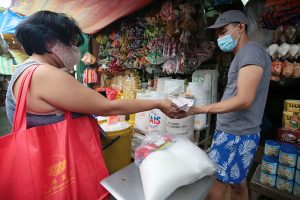By Chloe Mari A. Hufana, Reporter
MALACAÑANG said the September inflation reading of 1.7% is no cause for concern, adding that the indicator remains below the 2% lower limit of the government’s target band.
Palace Press Officer Clarissa A. Castro said she met with Economy Secretary Arsenio M. Balisacan and Secretary Frederick D. Go, the special assistant to the President for investment and economic affairs, who both downplayed the September indicator, which had accelerated to a six-month high.
“According to Secretary Go and Secretary Balisacan, the 1.7% figure is not a cause for concern for the government, as the projected band rate for this year is between 2% and 4%, which is still far off,” Ms. Castro said at a briefing. “They observed that the inflation rate is rising slowly.”
Price growth had accelerated from 1.5% in August, driven primarily by higher fuel and vegetable prices.
The Bangko Sentral ng Pilipinas (BSP) inflation target is 2-4%, with the September indicator within its forecast of 1.5-2.3% for the month.
Core inflation, which excludes volatile food and fuel prices, eased to 2.6% from 2.7% in August, though it was still higher than the year-earlier 2.4%.
In the first nine months, inflation averaged 1.7%, against 3.4% a year earlier.
The Philippine Statistics Authority attributed the uptick in September to the lingering impact of storms and flooding in July and August, which disrupted farming supply chains.
Vegetable inflation surged to 19.4% in September, the strongest reading in nine months.
Transport costs also contributed to the increase, with diesel prices rising 5.1%, while gasoline prices declined at a slower rate.
Food inflation was 0.8%, while the food and non-alcoholic beverage index rose to 1%.
Rice prices continued to decline for a ninth month, with regular-milled rice dropping to P37.79 per kilo and well-milled rice to P43.10.
The BSP credited this trend to adequate supply, lower global rice prices, and government interventions like a 60-day import ban.
Meat, fish, and seafood price growth eased.
Price growth was strongest in the Central Visayas at 4.1%, while that of the Bangsamoro Autonomous Region in Muslim Mindanao was at -1.5%.
The BSP maintained its forecast that inflation will fall below the 2-4% target band in 2025, citing stable rice prices and subdued global oil prices.
Risks to the forecast include rising global food prices, higher rice tariffs, and a potential increase in electricity rates.
Also cited as possible factors influencing price growth were weather disruptions, holiday spending, global oil prices, and a weak peso.

